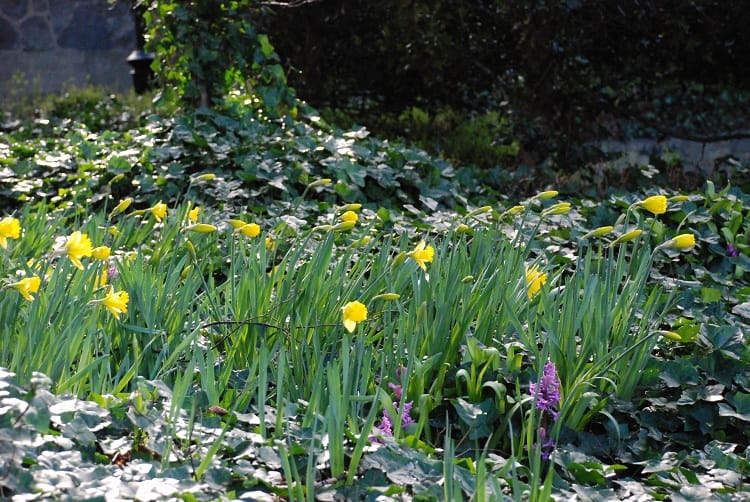What would become of the Civic Offices on Wood Quay if the council relocates?
After The Currency reported the idea of the council moving its HQ, councillors were talking about and thinking through the pros and cons and implications.
While there have been conflicting reports as to the dangers of glyphosate, found in some weedkillers, Stephen Doody wants Dublin City Council to stop using the chemical.

Stephen Doody started with the DIT’s Grangegorman campus back in 2015.
Now, he’s on a more ambitious campaign to end the use of herbicide sprays in the Dublin City Council area.
So far, his petition has been signed by 52 people.
Doody says he grew concerned when he was out and about with his children.
“We’d be in Fairview Park a lot and you see areas around playgrounds that have been sprayed,” he says. “This is citywide.”
“I’ve seen it here myself in North Strand where they’ll go along, spray weeds and two minutes later the kids are out playing on the footpaths,” he says. “That doesn’t get rid of the weed. The weed’s still there six weeks later.”
The more herbicides are used, the stronger the chemicals that are needed too, says Doody. He says this compounds the weed-blooming problem.
His petition asks that Dublin City Council “immediately stop” the use of such chemicals on Dublin’s streets and playgrounds. But that seems to be a ways off.
Dublin City Council used 3,500 litres of herbicide in 2014.
That hardly encourages biodiversity, says Doody. “If you’re trying to increase habitat there’s no point in spraying everywhere,” he says. “If you’re trying to increase water quality there’s no point in spraying [herbicide].”
The council has committed to introducing the recommendations of the All Ireland Pollinator Plan, to “reduce or eliminate” the use of herbicides on public land.
According to the Dublin City Biodiversity Action Plan 2015-2020, the council’s use of herbicides “will be examined, with a view to minimizing, and where possible, eliminating their use.”
Chemicals like glyphosate – often sold under the brand-name Roundup – were used in and around Dublin in 2015.
It’s not that Dublin City Council is pro-herbicides.
Green Party Councillor Ciarán Cuffe says the head of the council’s parks service, Les Moore, is in favour of reducing the use of herbicides.
“But he feels like he’s under pressure from certain councillors to maintain [its use],” says Cuffe.
This is because residents will often contact councillors about weeds in their area.
There have been alternatives discussed: digging out weeds, using hot water, flamethrowers and vinegar, says Cuffe. But “there’s no magical alternative as yet that’s easily available to Dublin City Council. (…) I think we should pilot a few alternatives.”
Back in July 2015, a Dublin City Council Press Office spokesperson said that it was looking at how to eliminate or reduce its use.
The press office didn’t respond to queries about current alternatives that the council is exploring.

There is also still the ongoing debate over the science.
In March 2015, the International Agency for Research on Cancer classified the chemical glyphosate as “probably carcinogenic to humans”.
Last year, the World Health Organisation and the UN’s Food and Agricultural Organisation decided this was no longer the case, at least that it posed no risk “through the diet”.
Glyphosate is used in farming around the globe and is a key ingredient in Roundup weedkiller.
At the moment, the European Chemicals Agency is assessing the substance to see whether it is capable of harmful effects. It is expected to release its opinion in November 2017.
Doody hopes the council will take action to end – or at least limit – its use of herbicides soon, and replace it with local clean-ups or weeding staff.
“But I can understand, to an extent, why they say they can’t stop using it completely, say for invasive species,” he says.
The Dublin City Biodiversity Action Plan 2015-2020 does recommend that any change in herbicide use “will require a clear and well-thought out series of actions, which does not entail an overnight switch to a new regime, but rather a structured step-by-step approach”.
They could try what’s been done elsewhere.
In Lawrence, Kansas, in the United States, the city management separated various areas into different zones.
These zones were labelled green or yellow, depending on whether pesticides should be used within them.
Whether the council adopts a similar project remains to be seen.
Cuffe of the Green Party says he expects an update on progress that council officials have made, and what their current position is on pesticide use, during the next meeting of the council’s Central Area Committee, in March.
People, especially young parents, don’t want their children to play in areas where herbicides have been sprayed, he said.
“That the guys spraying these [chemicals] often have to wear masks … they [parents] get concerned about their kids and that’s a legitimate concern,” he said.